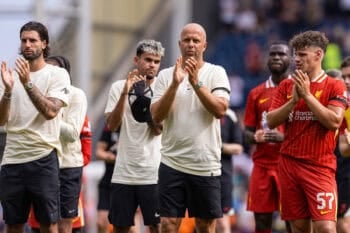Joe Fagan – Reluctant Champion – The Authorised Biography

By Andrew Fagan and Mark Platt
London, Aurum Press Limited
There are some people who only have a passing interest in football in their lives. I guess that they would think that supporting Liverpool FC from the sixties through to 1990 was a relaxing, perhaps slightly boring, stroll through endless compressive victories whether at home or abroad. These people would think that there was a procession of endless top quality players trooped through the doors of Anfield.
Furthermore, a succession of supreme managers sat in the home dug out watching with pride, as their carefully thought-out formations effortlessly delivered their results. These people would conclude that footballing life was generally great in the red half of Merseyside apart from the dreadful disasters of Heysel and Hillsborough.
This book delves deeper than this summary, and particularly examines a specific period of the club’s history that is defined by memorable successes but concludes with the deepest of tragedies. There seems to be too many football books on the market that just glibly trawl through a load of match reports with the odd forgotten interview shorn into the chapters to make the book a book, rather than a leaflet. This account is not one of them.
I finished reading this book four days ago, and I am still thinking about it now. A glance through the bibliography at the back of this book shows that a large amount of research was done to ensure that this book was a comprehensive account of a manager who gave so much for the game as well as Liverpool Football Club.
The book deals with a period of Liverpool FC’s history which occurred literally before I began to recognise what Match of the Day and Kenny Dalglish was. I cannot remember watching some of the matches and the events in real time, which are featured within this book. Therefore, the most draining part of this account, which left the massive impact on me, was the final chapter that deal with the dramatic and traumatic events at Heysel. The dreadful cloud of Heysel has rumbled along from the middle of this book. Even the account of the European Cup Final from 1984 is concluded with some comment about the post-match battles around Rome graphically described by The Observer’s Hugh McIlvanney as a “jolly game of lynch-the-Brits.” The troubles in the English, and international game, of the mid-eighties dramatically contrast with the more gentle and diligent nature of Joe Fagan.
When talking about Heysel, the book focuses on Fagan’s desperate attempts to try and quell the delicate situation in the Brussels Stadium. With tears pouring down his cheeks, Fagan pulls off his suit jacket and smart shirt to reveal a red Liverpool top. He tries to reason with the crowds but it is unsuccessful. His last game as Liverpool manager ends in tragic circumstances. A dreadful image of Fagan in tears, being helped across the tarmac at Speke Airport by Roy Evans, is included within this book, and dramatically contrasts with the happy front cover shot of the 1984 European Cup, shot around a year earlier. Some other books desperately try to find contrasts which are not always there. This is a book that does not need to manufacture any comparisons. Events seem to speak for themselves.
The European Cup Final of 1984 is one of the happiest moments of the book, which is the ultimate culmination of Fagan’s treble in his first season of management. Sometimes, tales of big matches become mired in corniness, like a football version of the Gladiator movie. This book makes you feel that you were in the stadium on that barmy Wednesday in May 1984. The tension rises as the Reds prepare for the penalty shoot-out, and there is a nice line of pleasant surprise when the untested penalty takers manage to deliver the goods for the team. The winning jig of Alan Kennedy defines that match in Rome, and the Fagan’s treble should never be forgotten.
Throughout this book, you will be reading about a man who was a devout servant to the game of football and to Liverpool Football Club. Compared to today, when some youngsters believe that one trial will mean that they will be playing in the World Cup within a couple of years, Fagan’s football ‘journey’ is much more of gradual rise. After thirteen years of playing loyalty for Manchester City, Fagan builds up his coaching career around the clubs at northern England including a spell at Nelson in Lancashire, followed by his notable spell at Liverpool under Shankly, and Paisley.
Throughout the book, you get this impression that Fagan does not want to get any notification for his role. It is his love of football and Liverpool Football Club that keeps him going on as daily basis. The book goes through the various successes of the Shankly and Paisley years from the perspective of Fagan’s role, and the famous Boot Room. It is not always a procession of effortless victories. Saturday 26th December 1981, when Liverpool lost to Manchester City by three goals to one, is mentioned as a key example when Fagan let rip into the dressing room of football superstars. In a much more effective way than an ex political leader, the quiet man had literally turned up the volume, due to his desperate wish that those high standards to return to Liverpool’s game. It appears that many players can still remember that stern pep talk nearly thirty years ago.
The transition from coach to manager occurs in the early summer of 1983. In terms of a smooth transition, the change of manager’s chair could not have gone better in the minds of the ultimate Liverpool hierarchy. Fagan has to adapt himself into his new role. The diaries of the summer shows that this move was not entirely easy for him, but although there are mostly ‘ups’ in the 1983-1984 season, there are some downs. A slightly difficult relationship with Craig Johnson is one of the issues, which is mentioned on some occasions, during this book, including the 1984 League Cup Final. Fagan struggles to reconcile himself to drop players from his staring XI, although he does show some resolve.
Regardless of what happens in Brussels on the 29th May 1985, the 1984-1985 football season is not entirely straightforward for Liverpool FC as well as Joe Fagan. Liverpool do not immediately begin to pull up trees during the first half of the campaign. The team fail to gather enough points before Christmas 1984, and the squad desperately finds itself trying to play catch up with a number of other team in the UK including Everton. The book defines this period as Joe Fagan being a victim of his own success, but there are some hints that the struggle to replace the charismatic captaincy and midfield presence of Graham Souness was a struggle for Fagan. Injuries and the bedding in of new signings, as well as the loss of form from some long-established players are other factors, but European football remains not a problem for the Reds. Fagan’s two seasons of management are totally different.
I am unsure whether Joe Fagan would have enjoyed the life of a modern football manager In this era when managers are expected to provide a random quote to satisfy a couple of TV seconds, or a line in a newspaper. Fagan wanted to be working with the players in Melwood and then head home to think about the team that would play on the following Saturday. I also enjoyed the comment that Fagan did not think that football represented a physical version of quantum physics, and was a merely simple game to get the ball in the back of the net. Maybe that attitude is not allowed to be believed in the modern game, but Joe Fagan’s attitude was refreshing. After reading this book, I just wish that the career of this honourable man, had not ended in such dreadful circumstances.















Fan Comments